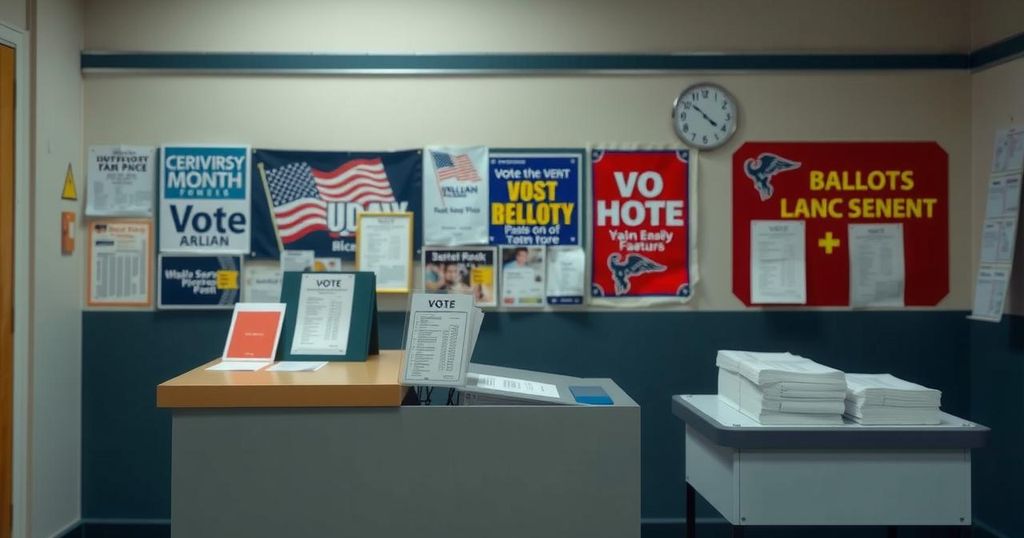Voters Reject Election Reform Initiatives Despite $110M Advocacy Efforts

In the recent U.S. elections, voters decisively rejected multiple election reform initiatives, including ranked choice voting and open primaries, despite over $110 million in advocacy funding. Key states like Arizona and Nevada opposed these measures, reflecting a preference for traditional voting methods. Proponents of the reforms plan to reevaluate strategies and consider more gradual changes to promote electoral inclusivity.
In the recent midterm elections, numerous election reform initiatives across several states in the United States were overwhelmingly rejected by voters, despite a substantial financial push exceeding $110 million from advocacy groups. Hopes had been high among reformers advocating for changes such as open primaries and ranked choice voting, yet voters in states including Arizona, Colorado, and Nevada opted against these proposals. John Opdycke, president of Open Primaries, encapsulated the setback by stating that the movement may not have been prepared for such significant changes at this time.
The reform measures aimed to transform voting processes by allowing all candidates to compete on a single ballot and enabling voters to rank their preferences, thereby fostering greater inclusivity in elections. Nonetheless, the outcomes suggest a preference among the electorate for maintaining traditional voting systems. A notable opposition voice, Trent England of Save Our States, articulated that the status quo in voting aligns with the general sentiment of many Americans.
The defeat of these proposals was unexpected, especially following earlier successes such as Alaska’s approval of similar reforms in 2020. States like Nevada also seemed poised for reform after initial approvals, but this year’s rejections indicate a significant shift in voter sentiment. Data revealed that ranked choice voting did not significantly alter election outcomes in many jurisdictions; only three candidates who started behind in votes were ultimately victorious through ranking systems. This raises concerns about the practical effectiveness and voter acceptance of such reforms.
Despite some localized success, such as in Portland, Oregon, where ranked choice voting was implemented, polling reflects that a significant portion of voters either struggled with the new system or chose not to engage with ranked choices. Academic critiques have emerged questioning the overall benefits of these reforms, citing potential voter confusion and lack of consistent participation from diverse demographic groups.
In light of these setbacks, reform advocates plan to reassess their strategies moving forward. They are considering adjusting their focus by separating initiatives for open primaries from those advocating for ranked choice voting, as well as pursuing less ambitious incremental changes through state legislatures. John Opdycke remarked on the need for a stronger grassroots foundation prior to launching significant campaigns for reform, indicating a reflection on the approach taken this election cycle.
Organizations like Unite America, which invested heavily in ending partisan primaries, are examining feedback from voter surveys to refine their strategies. Executive Director Nick Troiano emphasized the ongoing commitment to these initiatives, framing the future not as a question of whether they should continue, but rather how they can successfully achieve their goals.
The discussion surrounding election reform in the United States has gained notable traction in recent years, particularly with proposals aimed at revolutionizing the voting process. Initiatives include open primaries, whereby candidates from all parties appear on the same ballot, and ranked choice voting, which allows voters to rank candidates by preference. These reforms aim to combat partisanship and provide voters with a greater choice. Despite significant funding and initial momentum, the recent elections revealed a prevailing hesitance among voters to adopt these alternatives, underscoring the complexity and entrenched nature of voting practices in America.
The rejection of significant election reform measures in the recent U.S. elections highlights a disconnect between advocacy efforts and voter readiness for change. Even with substantial financial backing, the proposals for open primaries and ranked choice voting failed to resonate with a majority of the electorate. As advocates regroup and reconsider their approaches, the path forward may involve more gradual and incremental changes rather than sweeping reforms that could challenge longstanding voting traditions.
Original Source: abcnews.go.com







